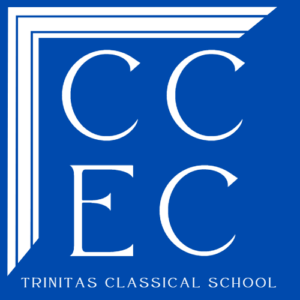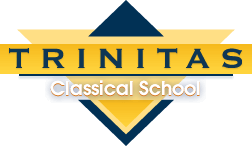 Trinitas was excited to host Dana VanderLugt, author of Enemies in the Orchard, last week during Friday Focus. Students who read (or were in the process of reading) enjoyed a time of hearing from Mrs. V about her experience of writing a book (revise, revise, and then revise some more!) as well as her inspiration for researching this often-overlooked bit of history. As Mrs. V shared during her talk, “The historian will tell you what happened. The novelist will tell you what it felt like.” — D. L. Doctorow
Trinitas was excited to host Dana VanderLugt, author of Enemies in the Orchard, last week during Friday Focus. Students who read (or were in the process of reading) enjoyed a time of hearing from Mrs. V about her experience of writing a book (revise, revise, and then revise some more!) as well as her inspiration for researching this often-overlooked bit of history. As Mrs. V shared during her talk, “The historian will tell you what happened. The novelist will tell you what it felt like.” — D. L. Doctorow
School News
Apples Never Fall Too Far From the Tree
March 22nd, 2024Apples Never Fall Too Far From the Tree
March 21st, 2024 Trinitas was excited to host Dana VanderLugt, author of Enemies in the Orchard, last week during Friday Focus. Students who read (or were in the process of reading) enjoyed a time of hearing from Mrs. V about her experience of writing a book (revise, revise, and then revise some more!) as well as her inspiration for researching this often-overlooked bit of history. As Mrs. V shared during her talk, “The historian will tell you what happened. The novelist will tell you what it felt like.” – D. L. Doctorow
Trinitas was excited to host Dana VanderLugt, author of Enemies in the Orchard, last week during Friday Focus. Students who read (or were in the process of reading) enjoyed a time of hearing from Mrs. V about her experience of writing a book (revise, revise, and then revise some more!) as well as her inspiration for researching this often-overlooked bit of history. As Mrs. V shared during her talk, “The historian will tell you what happened. The novelist will tell you what it felt like.” – D. L. Doctorow
Congratulations, 7th and 8th Graders!
March 15th, 2024Congratulations to six of our students in our 7/8 class upon the selection of their essays for the National Civics Bee! This year the 7th and 8th graders entered the first ever National Civics Bee in Michigan, sponsored locally by the Grand Rapids Chamber of Commerce. Each student studied an issue he or she felt was important for the community and wrote an essay about the problem and a proposed solution with attention to Founding Principles and civic virtues. The larger goal of the contest is to engage students in their communities and build their awareness of how citizens’ voices and involvement are crucial to the flourishing of society.
Composer Spotlight — Edvard Grieg
March 8th, 2024Students in music class are learning about Edvard Grieg—a Norwegian composer from the Romantic period who was connected with the ideas of nationalism in music. His most famous piece is the symphony Peer Gynt, which was written to accompany Henrik Ibsen’s play of the same name. “In the Hall of the Mountain King” is part of that symphony; it might sound familiar!
CCE Corner — Fear Not: Failure and Formation, part I
March 7th, 2024 When I sat down to write this post, I struggled to find a title. Using the word “failure” produced something of a visceral reaction in me. Associating that word with Trinitas seemed like a bad marketing move. I decided to risk it. Our virtue focus this quarter is Perseverance. Our hall and classroom posters display a definition from Plato: “a bearing up under labor for the sake of what is honorable.” We all know perseverance involves labor; this post explores the bookends of that definition: the “bearing up” and the “for the sake of what is honorable” parts.
When I sat down to write this post, I struggled to find a title. Using the word “failure” produced something of a visceral reaction in me. Associating that word with Trinitas seemed like a bad marketing move. I decided to risk it. Our virtue focus this quarter is Perseverance. Our hall and classroom posters display a definition from Plato: “a bearing up under labor for the sake of what is honorable.” We all know perseverance involves labor; this post explores the bookends of that definition: the “bearing up” and the “for the sake of what is honorable” parts.
Taking the latter part first—what does Plato mean by “for the sake of what is honorable”? Hard work is always aimed at something. Sometimes we need to pause and ask, “What am I working so hard for?” Asking this question can produce all kinds of responses, from staying the course to relatively minor adjustments to existential transformations. It can be a motivating question—remembering a goal of running a marathon can get one out of bed on a cold, rainy Saturday morning. It can be a course-altering question—an examination of our family’s hectic weekly pace during middle school years led us to cut back on some activities (good as those activities all were). Notice that perseverance, with its “for the sake of what is honorable” framing, may actually lead someone to quit something. Perseverance that does not aim at something good or that comes at too heavy of a cost to other goods or better goods is not a virtue but rather the vice of obdurateness.
Introducing a Familiar Face
March 1st, 2024We are excited to announce that Stephanie Sneller has accepted the role of Marketing Director for Trinitas Classical School. Bringing the same enthusiasm and creativity that she developed as Parent Service Fellowship Chair, along with experience from former employment, Mrs. Sneller is excited to share with the surrounding community about Trinitas and the joy of a classical, Christian education.
Protect Young Eyes Event
March 1st, 2024 LaGrave Christian Reformed Church is hosting a Protect Young Eyes Sunday, March 17 at 10:00 a.m. Learn from trusted experts at PYE what it takes to help kids learn to use technology well. This presentation introduces parents to the 5 foundational PYE Core Values and stresses the importance of both prayer and practice in having a tech-safer home. We encourage you to attend!
LaGrave Christian Reformed Church is hosting a Protect Young Eyes Sunday, March 17 at 10:00 a.m. Learn from trusted experts at PYE what it takes to help kids learn to use technology well. This presentation introduces parents to the 5 foundational PYE Core Values and stresses the importance of both prayer and practice in having a tech-safer home. We encourage you to attend!
Composer Spotlight — Antonin Dvorak
February 23rd, 2024Students are learning about Antonin Dvorak. His American Quartet is a beautiful piece to listen to in the car or while cooking or drawing or dancing together. Listen for the bird sounds Dvorak incorporated into the music.
Looking for Book Character Day Props?
February 23rd, 2024Looking for costumes, props, or specific articles of clothing? Stop by the office to see what items have been posted on the “Available” side or place your own “Wanted” ad requesting items. If you have extra items at home please consider posting what you have available as well.
Family Gym Game Night
February 23rd, 2024Family gym night is coming Friday, March 8. Doors open at 6:30 p.m. Families are invited to test their meddle as students take on the parents and teachers in favorite games such as wallie-ball, relay races, and of course dodgeball. We will also make some space in the first and second grade classrooms as a quieter area for those needing a break from the excitement happening in the gym. Families are welcome to bring water bottles and snacks, but we recommend eating dinner prior to arriving at the school. Parents, as a reminder, you must stay with your child(ren), as this is a family event.
